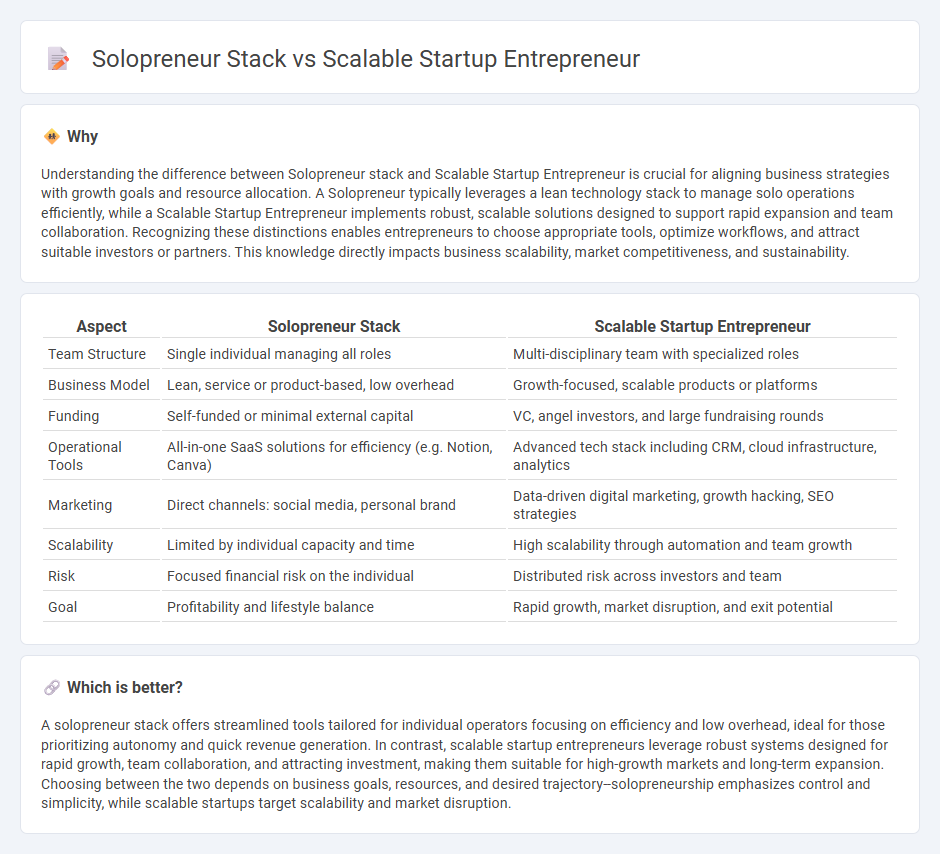
Solopreneur stacks focus on individualized skills and tools that enable a single entrepreneur to manage all facets of a business efficiently, often relying on automation and outsourcing. Scalable startup entrepreneurs emphasize building systems and teams designed for rapid growth, securing venture capital, and developing products that can capture large markets. Explore the distinct strategies and tools that define each entrepreneurial approach to determine which path aligns with your business goals.
Why it is important
Understanding the difference between Solopreneur stack and Scalable Startup Entrepreneur is crucial for aligning business strategies with growth goals and resource allocation. A Solopreneur typically leverages a lean technology stack to manage solo operations efficiently, while a Scalable Startup Entrepreneur implements robust, scalable solutions designed to support rapid expansion and team collaboration. Recognizing these distinctions enables entrepreneurs to choose appropriate tools, optimize workflows, and attract suitable investors or partners. This knowledge directly impacts business scalability, market competitiveness, and sustainability.
Comparison Table
| Aspect | Solopreneur Stack | Scalable Startup Entrepreneur |
|---|---|---|
| Team Structure | Single individual managing all roles | Multi-disciplinary team with specialized roles |
| Business Model | Lean, service or product-based, low overhead | Growth-focused, scalable products or platforms |
| Funding | Self-funded or minimal external capital | VC, angel investors, and large fundraising rounds |
| Operational Tools | All-in-one SaaS solutions for efficiency (e.g. Notion, Canva) | Advanced tech stack including CRM, cloud infrastructure, analytics |
| Marketing | Direct channels: social media, personal brand | Data-driven digital marketing, growth hacking, SEO strategies |
| Scalability | Limited by individual capacity and time | High scalability through automation and team growth |
| Risk | Focused financial risk on the individual | Distributed risk across investors and team |
| Goal | Profitability and lifestyle balance | Rapid growth, market disruption, and exit potential |
Which is better?
A solopreneur stack offers streamlined tools tailored for individual operators focusing on efficiency and low overhead, ideal for those prioritizing autonomy and quick revenue generation. In contrast, scalable startup entrepreneurs leverage robust systems designed for rapid growth, team collaboration, and attracting investment, making them suitable for high-growth markets and long-term expansion. Choosing between the two depends on business goals, resources, and desired trajectory--solopreneurship emphasizes control and simplicity, while scalable startups target scalability and market disruption.
Connection
Solopreneurs often develop specialized skill sets and lean operational strategies that form the foundation for scalable startup ventures by efficiently testing market demand and refining value propositions. The transition from a solopreneur to a scalable startup entrepreneur involves leveraging initial customer insights, automating processes, and securing investment to expand product offerings and enter broader markets. This connection underscores the iterative growth model where solopreneur agility catalyzes scalable startup innovation and sustainable business growth.
Key Terms
Venture Capital
Scalable startup entrepreneurs prioritize building high-growth companies with the aim of securing venture capital funding to rapidly expand their market presence and operational capacity. Solopreneurs typically rely on bootstrapping and organic growth strategies, focusing on sustainable income without external investor involvement. Explore detailed comparisons on funding strategies and growth potentials between scalable startups and solopreneurs.
Lean Startup
Scalable startup entrepreneurs utilize Lean Startup methodologies to build scalable business models through iterative product development, validated learning, and customer feedback loops, enabling rapid growth and investment readiness. Solopreneurs, on the other hand, focus on streamlined, resource-efficient workflows to maintain flexibility and control, often leveraging automation tools and niche marketing strategies. Explore key differences and strategies to optimize your entrepreneurial journey in the Lean Startup framework.
Bootstrapping
Bootstrapping strategies differ significantly between scalable startup entrepreneurs and solopreneurs, with scalable startups emphasizing rapid resource allocation for growth while solopreneurs prioritize lean operations and self-sufficiency. Venture capital, angel investments, and equity financing often complement scalable startup bootstrapping, whereas solopreneurs rely heavily on personal savings, frugal spending, and incremental revenue reinvestment. Explore deeper insights into scalable startup and solopreneur bootstrapping techniques by diving into expert resources and case studies.
Source and External Links
Understanding the Scalable Startup Entrepreneur Mindset - A scalable startup entrepreneur combines ambition and agility, focusing on long-term growth, data-driven decisions, and building adaptable business models that facilitate rapid scaling through metrics like Customer Acquisition Cost and Monthly Recurring Revenue.
Scalable Startup Entrepreneurship | PPTX - SlideShare - Scalable startup entrepreneurship involves launching a unique business with a plan aimed at creating a repeatable and scalable model, supported by the right mix of capital, expert human resources, and technology to foster growth.
What is Scalable Startup Entrepreneurship - YouTube - Scalable startups target large, high-growth markets using technology and innovative business models like subscriptions or platform fees to enable rapid scaling and sustainable revenue growth.
 dowidth.com
dowidth.com